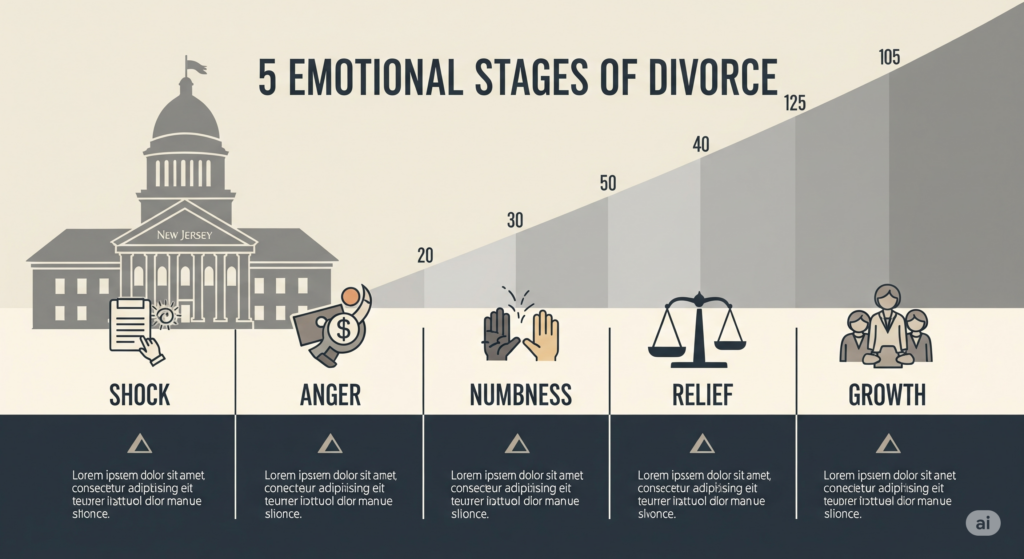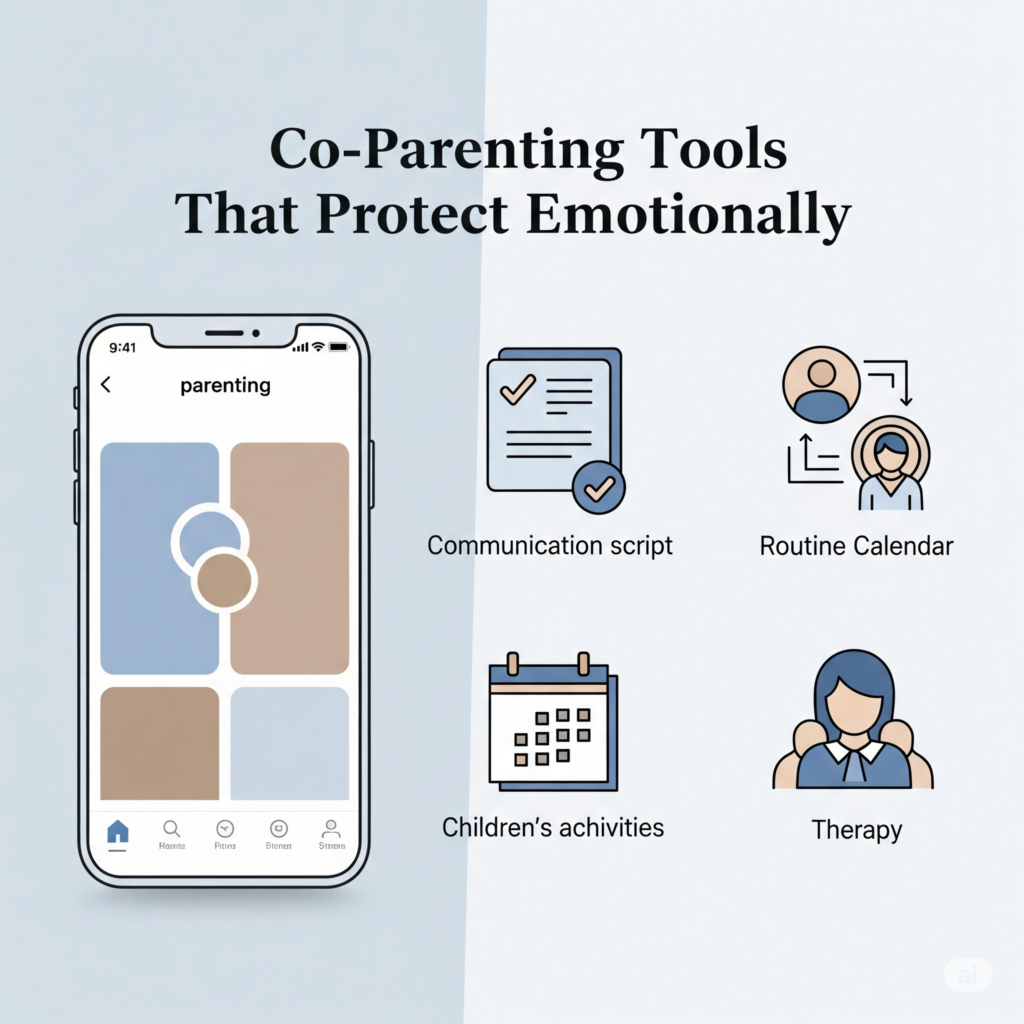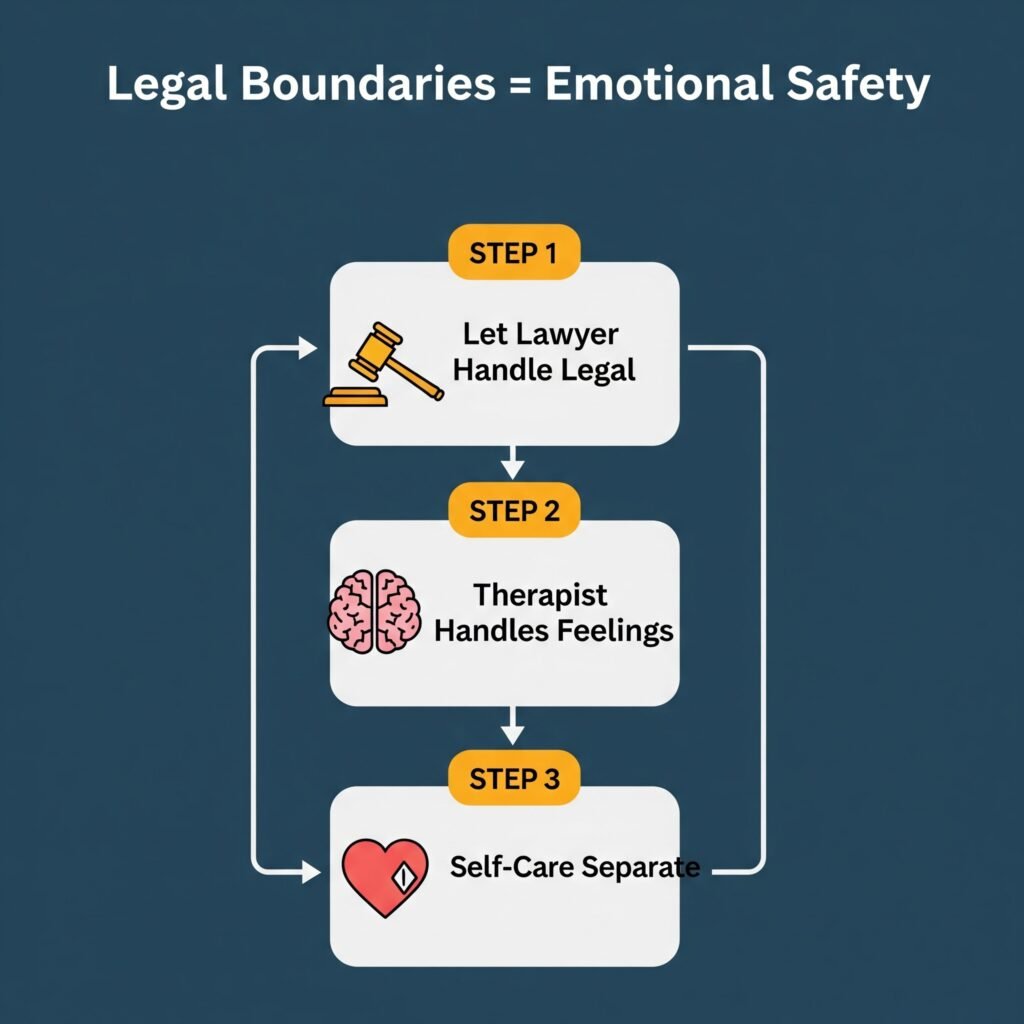When your marriage ends, it does not just tear apart your legal status. It cracks the foundation of your identity.
You wake up and do not know who you are without the “we.” You feel waves of fear, flashes of rage, moments of clarity followed by fog. You tell yourself to stay strong—but your insides feel like a storm. If you are coping with divorce in NJ right now, know this: your emotional reaction is not a sign of weakness. It is the human experience of loss, change, and reclaiming your power.
This is your survival guide. Not the kind filled with clichés. This is the kind filled with truth.
Quick Summary
Divorce in New Jersey is not just a legal process—it is an emotional transformation. This guide offers coping strategies that truly work, including daily habits, co-parenting tools, and ways to separate emotional overwhelm from legal action. Learn how to protect your peace while navigating the court system and discover how Ziegler Law Group supports clients through both the legal and human sides of divorce.
The Emotional Reality of Divorce in New Jersey
Why Divorce Hits Harder Than You Expect
Even when the decision feels right, divorce can leave you unmoored. In New Jersey, legal proceedings are long, personal lives are scrutinized, and financial pressure often adds a heavy layer of stress.
“I thought I was ready. I thought I wanted it. But when the paperwork came, I froze.”
— Former client, Essex County
Common Emotional Phases
Divorce grief does not follow a straight line. You might feel:
- Shock and denial — “This is not really happening.”
- Anger or blame — “How could they do this to me?”
- Depression or numbness — “I do not even care anymore.”
- Relief and hope — “Maybe I can start over.”
The Myth of “Moving On Quickly”
You are not “behind” if you are still struggling months in. Healing is not linear. Especially if children, finances, or betrayal are involved.

Understanding your emotional journey—shock, anger, numbness, relief, and hope—is the first step in surviving divorce.
Coping Strategies That Actually Work
Build a Support Network That Feeds You—Not Drains You
Not everyone is equipped to help. Some friends will talk too much; others will ghost you. Choose your people carefully:
- A therapist or divorce coach
- One or two emotionally safe friends
- A support group (try NJ-based online or in-person meetups)
Let go of anyone who dismisses your pain or uses your divorce for gossip.
Ground Yourself in Daily Habits
Surviving divorce is not about massive breakthroughs—it is about tiny rituals that keep you anchored.
- Spent 20 minutes outside, even if it is cold
- Use a journaling prompt: “Today I felt __ because __”
- Try breathing apps like Calm or Insight Timer
- Put your phone on airplane mode for one hour a night
Reclaim Your Mind Through Mindfulness
Your thoughts will lie to you during divorce. Mindfulness helps separate emotion from fact. Try:
- Guided meditations for grief or anger
- 5-4-3-2-1 sensory resets
- Reading “Radical Acceptance” by Tara Brach or “Split” by Suzanne Finnamore
📍 Need a roadmap? Book a consultation with a divorce lawyer in NJ who values your emotional wellness as much as your legal outcome.
You Are Allowed to Feel Everything, But You Do Not Have to Act on It
Grief, anger, confusion, relief—all of these emotions are part of the divorce process. The key is learning how to experience them safely. Tools like journaling, guided therapy, and emotional scripts can help you process without harming your legal outcome. You do not have to suffer silently—and you do not have to figure it out alone.
Co-Parenting Without Emotional Collapse
Communicate With Clarity, Not Conflict
Use apps like OurFamilyWizard to document communication and reduce real-time emotional reactions.
Scripts help:
- “Let’s keep this focused on the children.”
- “Please refer to the schedule in our court agreement.”
- “I am not available for non-parenting communication right now.”
Protecting Your Children Emotionally
Kids mirror your energy. They feel what you do not say. Try:
- Reassuring statements: “Both of us still love you very much.”
- Keeping routines stable, even if nothing else is
- Never using them to relay messages or gauge your ex’s life
Regulate Before You React
You are allowed to feel everything. But not everything needs to be shared or acted on. Call your therapist or vent in a journal—not during exchanges or legal meetings.

Tools like apps, structured scripts, and stable routines protect your peace—and your child’s—amid divorce.
The Legal-Emotional Connection: Why Your Lawyer Matters
A Good Lawyer Can Protect Your Sanity
Experienced NJ divorce lawyers do more than file motions. They protect you from:
- Overcommunication with your ex
- Emotional mistakes like court outbursts or inappropriate messaging
- Unfair asset or custody agreements made under stress
Define the Boundaries
Let your lawyer handle the legal. Let your therapist handle the emotional. When both professionals know their roles, you feel more in control.
Mistakes to Avoid:
- Oversharing in legal texts
- Ranting on social media
- Venting to your ex hoping for closure

Keeping the legal and emotional supports separate helps you stay sane under divorce pressure.
How Ziegler Law Group Supports Clients Holistically
We See You As a Whole Person
Our approach blends legal precision with client-centered compassion. We guide you through the paperwork and the panic. We ask the hard questions—without judgment.
Practical Support We Offer:
- Secure portals so you are not sorting through paperwork under pressure
- Regular communication so you never feel “ghosted”
- Referrals to NJ therapists and wellness professionals as needed
“Ziegler Law Group helped me feel human again—not just a case number. They gave me legal answers and emotional breathing room.”
— K.R., Bergen County
Key Takeaways: This Is Not the End—It Is a Rebirth
- Divorce shakes your world—but you are not alone in it
- Coping means choosing habits, boundaries, and people that protect your peace
- Co-parenting, legal communication, and emotional healing all need tools
- A great NJ divorce lawyer can lighten your emotional load, not add to it
Let Us Help You Heal and Move Forward
You are not “too emotional.” You are in one of life’s hardest transitions—and you deserve a legal team that gets that.
Frequently Asked Questions
1. Is it normal to feel numb during divorce?
Yes. Numbness is a natural response to emotional overload. It often follows periods of intense stress or shock and usually passes with time and support.
2. How do I stop obsessing over what my ex is doing?
Focus on boundaries. Limit social media exposure, stay grounded in your own healing, and work with a therapist to redirect mental energy to what you can control.
3. What is the best emotional support during divorce?
A combination of professional therapy, NJ divorce support groups, and practical legal guidance from a compassionate attorney is often most effective.
4. Can I talk to my lawyer about my emotions?
Yes—to an extent. Your lawyer can validate your stress but will focus on legal strategy. Use a therapist for deeper emotional processing.
5. How do I co-parent when I am emotionally drained?
Stick to a schedule, use communication tools, and remind yourself that consistency—not perfection—builds stability for your children.
6. What emotional mistakes hurt my divorce case?
Venting on social media, sending angry texts, or reacting emotionally in court can damage your custody or settlement outcomes.
7. Does therapy really help during a divorce?
Absolutely. Therapy provides a safe place to process pain, reduce reactivity, and rebuild identity—making your legal journey smoother.
8. How does Ziegler Law Group support clients emotionally?
We listen without judgment, keep communication clear, and guide clients with empathy. Many find our legal team helps ease—not amplify—the emotional toll.
📞 Speak with a New Jersey divorce lawyer who supports both your rights and your emotional survival. Book your confidential consultation today.






